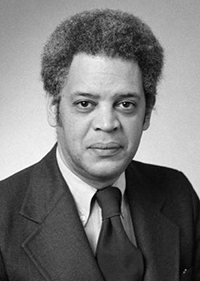NEWSLETTER
|
In Memoriam Spring 2017
Mr. Wilkins “waged war against racism from above the barricades,” observed The New York Times at the time of his death, “with political influence, jawboning, court injunctions, philanthropic grants, legislative proposals, and commentaries on radio and television and in newspapers, magazines and books”.
He went to Washington in 1962 to join the Kennedy Administration and was named special assistant to the head of the Agency for International Development. He stayed on when Lyndon Johnson became president and was involved in the campaigns for passage of the Civil Rights Act of 1964 and the Voting Rights Act of 1965. He later became an assistant attorney general during a period of intense racial unrest.
“The real threat to American life,” he said then, “is our inattention to the really depressed and anguished conditions of the minority group people who live in the ghettos of this country.”
When Richard Nixon was elected president Mr. Wilkins perceived a “turning away from the paths of cultural decency” and left government at the beginning of 1969 to become Program Officer in Charge of Social Development at the Foundation.
For the next three years, including appointment as program adviser to the president, he oversaw funding for job training, education, drug rehabilitation and other programs. But, noted The New York Times article, “he was powerless to support many projects he considered worthy and became disillusioned with the work.” He left Ford at the end of 1971 for a new career in journalism.
He struggled for years over his identity as a black man, writing in a memoir that the everyday “currencies” of black life “evolved away from me…. I didn’t know how to talk, to banter, to move my body”. He cited constant struggles with depression, suicidal thoughts and a deep unease as he tried to meet what he perceived as the expectations the white world had for him.
He gradually began to ease out of what he called his “desperate search for white approval” through a new life as a journalist. He wrote editorials for The Washington Post that, as part of the paper’s coverage of the Watergate scandal, won a Pulitzer Prize in 1973. He joined the editorial board of The New York Times a year later and became an Op-Ed page columnist.
From 1988 until he retired in 2007 he was the Clarence J. Robinson professor in history and American culture at George Mason University in Fairfax, Va. Throughout those years he wrote continually for newspapers and magazines and was a frequent commentator on radio and television.
Dr. Sally J. Oleon, who worked in special programs when she joined the Foundation in 1966 and was a program specialist when she left three years later, died February 15.
She had earned her doctorate from the University of Pittsburgh and, after leaving Ford, worked in several positions there and at George Washington University, including in the office of the vice president for academic affairs. She also was dean of academic affairs at Greater Hartford Community College.
Elissa Scatena, who died April 19, joined the Foundation in 1956 in the personnel office and was a staff assistant and administrative assistant in that office until becoming a grants administrator in 1969. She retired in 1997.
Betty Lou Hoffman, who worked as a secretary in the South and Southeast Asia program and then as an administrative assistant in the Asia and Pacific program, died March 21 in Lancaster, Pa. She was 84.
Ms. Hoffman, who was a graduate of Duke University, worked at Ford from 1965 through 1978, when she retired.
|


